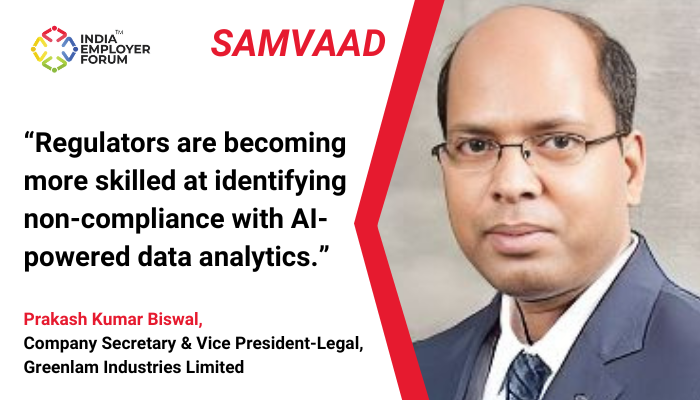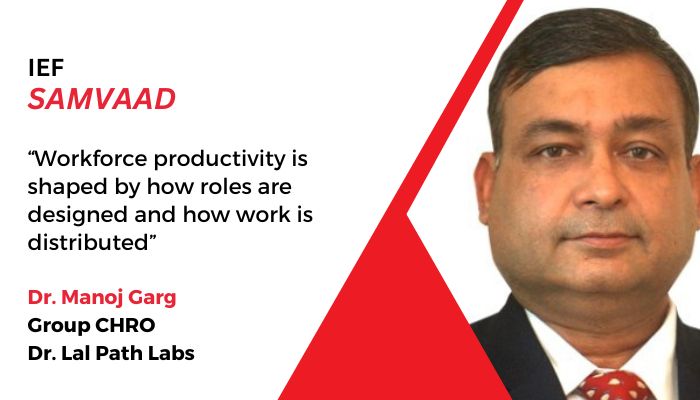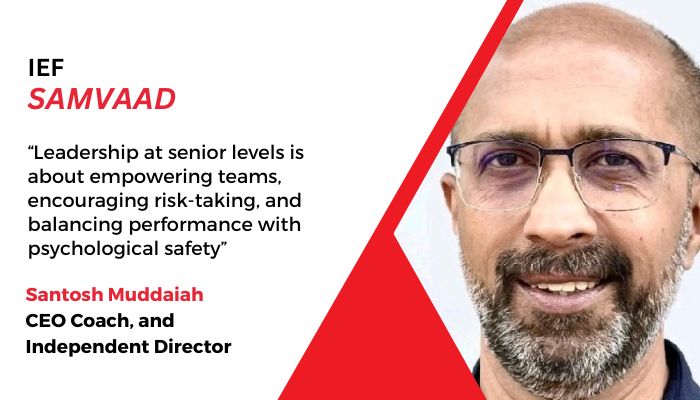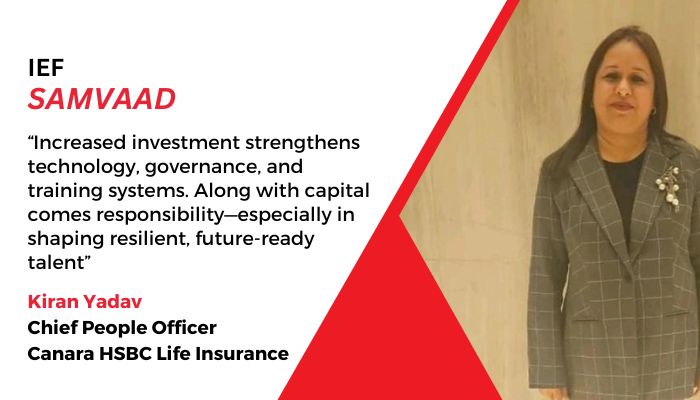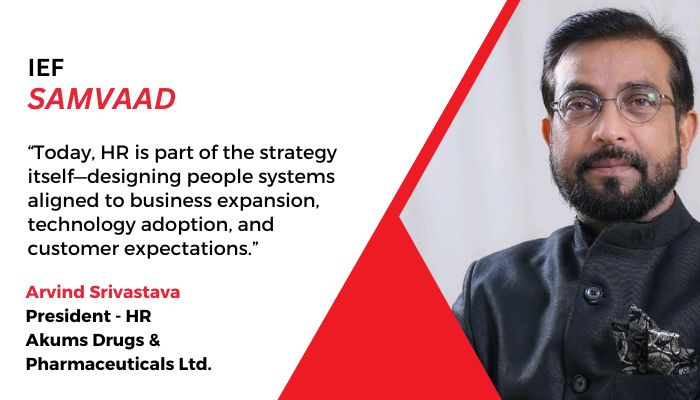Mr. Prakash Kumar Biswal, Company Secretary & & Vice President-Legal, Greenlam Industries Limited, speaks to India Employer Forum about a vast array of regulations including compliance, data regulations, storage management, etc.
Q. What is the regulatory framework for surfacing products in India?
In India, the regulatory framework for surfacing products operates within a unique landscape devoid of specific legislation dedicated to the sector. Instead, prominent manufacturers adhere to their own set of standards, which spans various facets, encompassing emission norms, Greenguard Gold certification, and the sustainable procurement of raw materials, with a particular emphasis on Forest Stewardship Council (FSC) standards. Additionally, stringent regulations govern the handling of chemicals used in the manufacturing process, necessitating licenses for their storage and management. Furthermore, considerations extend beyond mere regulatory compliance to encompass innovations geared towards enhancing the hygiene, health, and safety of end users. Notably, products boasting fire retardant, low VOC emission, anti-fungal, anti-bacterial and anti-viral properties face both marketing opportunities and increased compliance burdens, necessitating rigorous testing and certification to substantiate such claims. These claims and their certifications have to pass various litmus tests and be subjected to complex regulatory norms.
Q. What are the challenges you face in staying on the right side of the law?
The landscape is characterised by a vast array of regulations, subject to frequent and often complex amendments. While adherence to regulations instils discipline and a commitment to legal norms, the sheer volume of regulations and the dynamic nature of applicable laws pose significant hurdles. It is naturally tough to stay up to date with these changes and understand their implications outright. Furthermore, with the escalation of regulatory scrutiny and enforcement measures, it has become really critical to always remain on the right side of the law. Regulators are becoming more skilled at identifying non-compliance with AI-powered data analytics, which further emphasises the importance of paying close attention to all regulatory changes.
As a result, staying compliant with the complex web of regulations can take a lot of work for both individuals and businesses, requiring a proactive and flexible approach to stay compliant.
Q. What were the major regulatory upheavals over the past decade? How crucial are BIS certifications?
Over the past decade, significant regulatory shifts have shaped various industries, with notable changes observed in empowering the end consumers and increased accountability on the manufacturers. In the past, some products in India were only required to have a voluntary Bureau of Indian Standards (BIS) certification. But one significant change that has occurred recently is the move towards required BIS standards for various products, including wood-based products, which was sparked by the Department for Promotion of Industry and Internal Trade’s (DPIIT) initiatives.
Q. How important is the role of technology in your internal compliance functions?
This paradigm shift not only underscores a commitment to quality and safety but also aligns with broader national agendas such as “Make in India” and “Atmanirbhar Bharat.” By mandating BIS certifications, the regulatory framework aims to deter the influx of substandard products from foreign markets, thereby fostering domestic manufacturing capabilities and bolstering self-reliance in critical sectors. As a result, the way regulations have evolved—especially with regard to BIS certifications—reflects the deliberate fusion of regulatory requirements with more general industrial and economic goals.
In the modern digital world, technology is essential for smooth operation of internal compliance functions across industries and sectors. Technology is the key to streamlining operations, improving overall process efficiency, and optimising workflows as we navigate the complexities of the digital era.
Q. How have boardroom conversations around compliance evolved over the years?
From conducting internal audits to managing customer data in compliance with stringent regulations such as the General Data Protection Regulation (GDPR) for dealing with the personal data of European citizens and the recently introduced Digital Personal Data Protection Act (DPDPA), the integration of technology is not just advantageous but imperative. The sheer volume and intricacy of compliance requirements necessitate sophisticated technological solutions to ensure adherence and mitigate risks effectively. Technology has become a fundamental component of modern compliance workflows, allowing businesses to manoeuvre regulatory environments with confidence, accuracy, and agility.
Over the years, boardroom conversations around compliance have undergone a significant evolution, reflecting a heightened awareness of regulatory imperatives and their impact on corporate governance. Previously, board meetings often prioritised strategic agendas, with compliance relegated to the purview of a few functional heads and senior management. However, with increased scrutiny from regulators, bolstered by stringent legislative frameworks such as the Companies Act, 2013 and SEBI LODR Regulations, 2015, PIT Regulations etc., compliance has emerged as a primary concern for the board members. The board now dedicates considerable time to discussing compliance-related matters, especially to related party transactions and the necessity for approvals, even for transactions at subsidiary levels and also to the disclosure requirements of material events. Moreover, discussions have expanded to encompass pressing concerns such as cybersecurity, risk management, business continuity, and data protection. The audit and risk management committees now exhibit enhanced vigilance towards these areas, reflecting a broader shift towards proactive risk mitigation strategies within boardroom discourse. Senior management now actively engages in compliance functions to ensure alignment with the evolving regulatory landscape.
Q. How can young professionals get familiar with compliance and integrate into the culture of compliance?
Compliance is playing a bigger role in corporate governance with each passing day. On the one hand, regulators are implementing and adapting technology to become more vigilant, digitise compliances, and improve transparency. On the other hand, businesses are using digital solutions to improve their control and visibility over their compliance functions. Various regulatory transactional works have been visibly shifted to corporations, with more and more compliances going digital. For instance, XBRL reporting, on the one hand, necessitates putting numerous data in the returns and on the other hand, it has allowed the regulator to use data analysis and scrutinise the data instantly. AI is now being used to raise flags over discrepancies and deviations. As such, it becomes significantly important that young professionals are familiar with the compliance and reporting standards. Analytical tools can help compliance professionals pre-empt and pro-act on compliance obligations. While young professionals are increasingly tech-savvy, they also need to be masters of domain expertise and industry knowledge. Hence, it is imperative that they need to be groomed and retained for longer durations within a company to build appropriate business understanding.
Q. How has Ease of Doing Business affected the regulatory ecosystem?
The push for improving ease of doing business (EoDB), including decriminalisation of various corporate violations, has led to a sea change in the perception towards the business regulatory landscape. However, there is a distinct lack of quality at the operational and implementation levels. The agility and readiness to bring in reforms is a welcome change; however, rushing reforms without accounting for possible repercussions can cause significant damage. As such, while the intention is there, execution needs improvement. The initial issues with the new income tax and MCA V3 portals are well documented and have caused significant challenges for corporations. Furthermore, the lack of homogeneity in state-specific laws and regulations also causes complexities. There is a need to push for standardisation to promote EoDB further.
About Prakash Kumar Biswal
Mr. Prakash Kumar Biswal is a Law Graduate and a member of the Institute of Company Secretaries of India having over two decades experience in company secretarial operations, corporate compliances and legal affairs in manufacturing, real-estate & transportation industry with strong management and business judgment skills and capability to make decisions and give advice for business objectives and currently associated with Greenlam Industries Limited as Company Secretary & Vice President-Legal.
Disclaimer: The opinions and views expressed in this article, including any accompanying data, are the sole responsibility of the author and should not be construed as reflecting the official policy or position of India Employer Forum.

